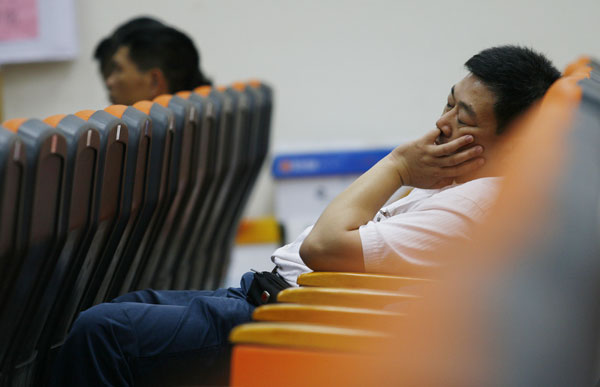Nothing to snore at
Updated: 2013-03-19 23:14
By Liu Zhihua (China Daily)
|
||||||||
 |
|
Experts say fast-paced lifestyles, pressure and obesity all contribute to the country's increasing incidence rate of sleep disorders. Deng Keyi / for China Daily |
March 21 is World Sleep Day and at a news conference marking the occasion, Chinese Sleep Research Society announced almost 40 percent of the Chinese population suffers from one form of sleep disorder or the other.
Most of the victims either neglect the problem or seek no medical help until the condition becomes very severe, experts say.
About 38 percent of Chinese people suffer from sleep disorders, with about 30 percent having insomnia and 4 percent suffering sleep apnea (a frequent closing of the throat while sleeping) - the two most common forms of sleep disorders, according to Han Fang, director of the sleep center at the Peking University People's Hospital, and president of CSRS.
The incidence rate is much higher than the world average, which is only 27 percent, according to Wang Weidong, a sleep disorders specialist and deputy director with Guang'anmen Hospital in Beijing, and vice-president of CSRS.
There are about 80 types of sleep disorders, consisting of both mentally and physically undesirable sleep patterns. They are usually related to depression and general anxiety, and can affect physical, mental and emotional functions if severe enough.
There is another cause of alarm. In an aging population, the incidence rates of cardiovascular and cerebrovascular diseases increase and sleep disorders can make this worse, Wang says.
People suffering from cardiovascular and cerebrovascular conditions tend to have sleep disorders, and these in turn aggravate these conditions, Wang explains.
Sleep is when the heart has a chance to slow down and rest. In unhealthy sleep, the nervous system, blood circulation and endocrine system will be disturbed, causing inflammation and blood plaque, which will harm the heart and increase hypertension, heart attacks and the possibility of stroke.
More than 1 million Chinese die of heart attacks each year, and about 30 percent of such deaths happen at night, Wang says.
Guo Xiheng, director of the sleep and breathing center at Beijing Chao-yang Hospital, and a council member of the Chinese Sleep Research Society, says he has seen a tremendous increase of sleep disorders in patients over the past 30 years. In most cases, by the time patients seek medical advice, their conditions are quite severe.
"Fast-paced lifestyles, pressure and growing waistlines all contribute to the increased number of sleep disorders," Guo says.
"Some people are alert to the quality of sleep but there are many who still overlook the problem. If a person suffers bad sleep for more than three days in a week, and the situation continues for a month, he should seek help from a doctor."

 'Taken 2' grabs movie box office crown
'Taken 2' grabs movie box office crown
 Rihanna's 'Diamonds' tops UK pop chart
Rihanna's 'Diamonds' tops UK pop chart
 Fans get look at vintage Rolling Stones
Fans get look at vintage Rolling Stones
 Celebrities attend Power of Women event
Celebrities attend Power of Women event
 Ang Lee breaks 'every rule' to make unlikely new Life of Pi film
Ang Lee breaks 'every rule' to make unlikely new Life of Pi film
 Rihanna almost thrown out of nightclub
Rihanna almost thrown out of nightclub
 'Dark Knight' wins weekend box office
'Dark Knight' wins weekend box office
 'Total Recall' stars gather in Beverly Hills
'Total Recall' stars gather in Beverly Hills
Most Viewed
Editor's Picks

|

|

|

|

|

|
Today's Top News
Boston bombing suspect reported cornered on boat
7.0-magnitude quake hits Sichuan
Cross-talk artist helps to spread the word
'Green' awareness levels drop in Beijing
Palace Museum spruces up
First couple on Time's list of most influential
H7N9 flu transmission studied
Trading channels 'need to broaden'
US Weekly

|

|







